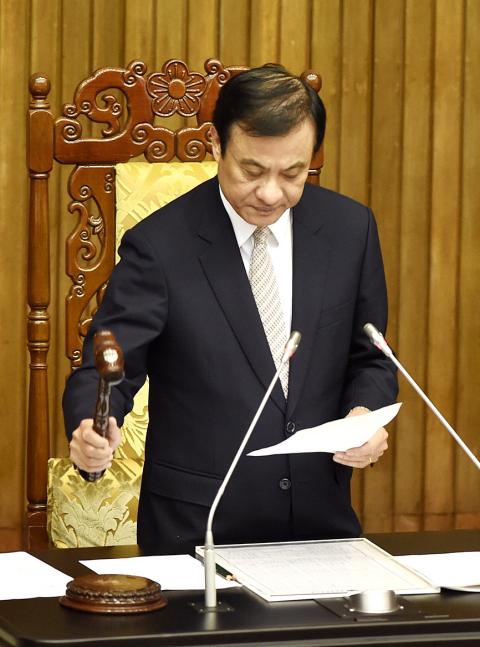The Legislative Yuan yesterday passed the Act for Uncrewed Vehicle Technology Innovations and Experiments (無人載具創新實驗條例), which exempts developers from certain legal restrictions when testing uncrewed vehicles for a prescribed period of time.
The act defines uncrewed vehicles as land vehicles, aircraft and ships — or any combination thereof — that are remotely controlled or capable of autonomous operations by surveying their surroundings, determining their position and determining the best route.
The law is based on the concept of a regulatory sandbox first incorporated in the Financial Technology Development and Innovative Experimentation Act (金融科技發展創新實驗條例), which was passed in December last year and allows financial technology firms to completely or partially bypass financial regulations when testing innovative financial services, said the Ministry of Economic Affairs, which governs autonomous vehicles.

Photo: Chien Jung-fong, Taipei Times
The act allows successful applicants to circumvent a plethora of mostly traffic laws when field testing uncrewed vehicles at locations designated by the ministry. These include items in the Road Traffic Management and Penalty Act (道路交通管理處罰條例), the Highway Act (公路法), the Civil Aviation Act (民用航空法) and the Ships Act (船舶法).
Monitoring staff should have full control over any uncrewed vehicle by way of unobstructed two-way communications using an automated system, the act stipulates.
In the event that applicants need to set up, manufacture or import telecommunications devices to test uncrewed vehicles, they can expedite the process by notifying the National Communications Commission without having to pass a review, the act says.
However, no uncrewed vehicle tests or experiments shall breach the Money Laundering Control Act (洗錢防制法) or the Counter-Terrorism Financing Act (資恐防制法), and applicants must shoulder any legal liabilities under the Civil Code or the Criminal Code as a result of their tests, it says.
Tests or experiments with uncrewed vehicles should not exceed one year and can be extended once by no more than a year after obtaining approval from the ministry, the act says.
The ministry should publish an overview of approved projects that includes their permitted scope, their time frame and the laws they are exempted from on its Web site and must inspect the testing location if necessary, it says.
It must order an applicant to make the necessary improvements should any test or experiment exceed the approved scope, affect public transportation, pollute the environment, threaten participants’ safety, or compromise national or social security, and it can terminate a project if an applicant fails to comply within a prescribed period.
Should an accident occur during testing, the applicant should immediately stop tests, inform the ministry and issue any necessary compensation to those affected, the act says, adding that testing should only resume after adequate measures are adopted to ensure safety.
Democratic Progressive Party caucus whip Ker Chien-ming (柯建銘) said that the act makes Taiwan the first nation to create a regulatory sandbox to aid research and development of uncrewed vehicles.

Taiwan is to commence mass production of the Tien Kung (天弓, “Sky Bow”) III, IV and V missiles by the second quarter of this year if the legislature approves the government’s NT$1.25 trillion (US$39.78 billion) special defense budget, an official said yesterday. Commenting on condition of anonymity, a defense official with knowledge of the matter said that the advanced systems are expected to provide crucial capabilities against ballistic and cruise missiles for the proposed “T-Dome,” an advanced, multi-layered air defense network. The Tien Kung III is an air defense missile with a maximum interception altitude of 35km. The Tien Kung IV and V

The disruption of 941 flights in and out of Taiwan due to China’s large-scale military exercises was no accident, but rather the result of a “quasi-blockade” used to simulate creating the air and sea routes needed for an amphibious landing, a military expert said. The disruptions occurred on Tuesday and lasted about 10 hours as China conducted live-fire drills in the Taiwan Strait. The Civil Aviation Administration (CAA) said the exercises affected 857 international flights and 84 domestic flights, affecting more than 100,000 travelers. Su Tzu-yun (蘇紫雲), a research fellow at the government-sponsored Institute for National Defense and Security Research, said the air

Taiwan lacks effective and cost-efficient armaments to intercept rockets, making the planned “T-Dome” interception system necessary, two experts said on Tuesday. The concerns were raised after China’s military fired two waves of rockets during live-fire drills around Taiwan on Tuesday, part of two-day exercises code-named “Justice Mission 2025.” The first wave involved 17 rockets launched at 9am from Pingtan in China’s Fujian Province, according to Lieutenant General Hsieh Jih-sheng (謝日升) of the Office of the Deputy Chief of the General Staff for Intelligence at the Ministry of National Defense. Those rockets landed 70 nautical miles (129.6km) northeast of Keelung without flying over Taiwan,

City buses in Taipei and New Taipei City, as well as the Taipei MRT, would on Saturday begin accepting QR code payments from five electronic payment providers, the Taipei Department of Transportation said yesterday. The new option would allow passengers to use the “transportation QR code” feature from EasyWallet, iPass Money, iCash Pay, Jkopay or PXPay Plus. Passengers should open their preferred electronic payment app, select the “transportation code” — not the regular payment code — unlock it, and scan the code at ticket readers or gates, General Planning Division Director-General Liu Kuo-chu (劉國著) said. People should move through the